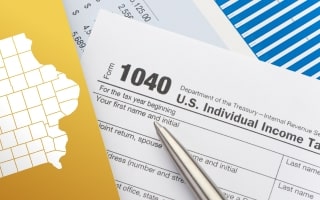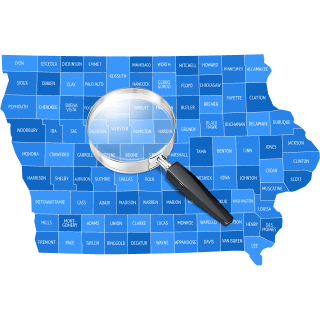Property Tax Records in Iowa

When you own any type of property in Iowa, the county you live in will task you with paying property taxes to help pay for local school systems, libraries, and other public services. The average property tax rate in Iowa is around 1.50%, which is substantially higher than the national average.
Even though several factors determine how much tax you need to pay each year, the value of your property is the main one. While your county will look at your home's assessed value to find out how much you owe, this can only be determined once they identify the market value of your property.
Your property taxes must be paid to the local treasurer in your county. Keep in mind that this tax also applies to any improvements and renovations you make to your home. The first installment of your taxes is due September 30, while the second installment must be paid in full by March 31 of the following year.
Unpaid taxes can incur a penalty, which is why it's highly recommended that you pay your bill on time. Many homeowners choose to fold their property tax bills into their monthly mortgage payments to ensure they pay them by their due date.
In Iowa, taxes began to be collected in 1839 once the state's first revenue act was passed into law. Even after Iowa gained statehood in 1846, this form of taxation remained in place. It allowed local and state governments to collect revenue that they could use to improve the state. In the early 1900s, property taxes would increase every year by nearly 12%.
Property Tax Assessment in Iowa

When you get a property tax bill in the mail, you'll need to make a payment to the county treasurer. No matter where you live, county taxes are paid twice every year, in March and September. However, you'll only receive one bill that details the two payments you owe.
Your property taxes are calculated based on numerous variables that the county takes more than 18 months to calculate and analyze. For example, the county or city assessor must first identify your property's valuation. In most cases, property valuations occur every two years.
In Iowa, the assessed value of a property is equal to its market value. If your property has a market value of $300,000, this will also be its assessed value. Before your property taxes are calculated, any Iowa property exemptions you qualify for will be deducted. The property tax rates for each county can change annually depending on budget requirements.
Your tax rate will be shown as dollars per thousand. Let's say that the tax rate in your area is 25. In this situation, you'll owe $25 for every $1,000 in total assessed value. If your home has an assessed value of $300,000, your annual tax bill will amount to $7,500. However, exemptions will likely reduce this by a considerable amount. The property tax rates for the top five counties in Iowa are:
- Polk County: 2.10%
- Linn County: 1.94%
- Scott County: 1.74%
- Johnson County: 1.83%
- Black Hawk County: 1.75%
As you can see, Polk County property taxes are higher than average, but with exemptions, they are still reasonable when compared with other states.
Calculate Iowa Taxes
Using an Iowa property tax calculator is a smart way to understand how property taxes are calculated in the state. This tool helps both homeowners and real estate investors estimate their tax assessment and annual liability by entering key property details such as location, market value, and any applicable exemptions.
An Iowa property tax calculator provides a clearer picture of your annual tax responsibilities and can help identify available exemptions and tax relief programs, including the Homestead Credit, which reduces the taxable value for owner-occupied homes, and the Property Tax Credit for Seniors and Disabled Individuals, which offers income-based relief. Additional credits and exemptions may apply for veterans, agricultural landowners, and others, depending on eligibility and local provisions.
using our property tax calculator.
Iowa Property Tax Records: What Are They?

As touched upon previously, the property taxes you pay in Iowa are used by individual counties to pay for various public services. Once county treasurers collect these taxes, they will be distributed to the local authorities. Depending on the county, property taxes usually support school districts, townships, and libraries.
If you're in the market to buy a home, consider researching the property tax records in Iowa. These records allow you to identify how much the owners pay every year in taxes. You'll also be able to view details of the property, which can help you make an accurate offer based on the market value and assessed value. The information that's available on a property tax record includes the following:
-
Deed holder
-
Parcel number
-
Property address
-
Tax district
-
Zone
-
Legal description
-
Homestead credit or military exemption
-
Downloadable property report
-
Current tax year estimate
-
Market value
-
Assessed value
-
Information about the building, including rooms, bathrooms, plumbing, and garages
-
Previous sales data
-
Value of any renovations
-
Sketch of property
Property Tax Exemptions and Deductions in Iowa

When you live in Iowa, there are several exemptions that you might be able to qualify for if you're a homeowner. If you receive at least one of these exemptions, you can reduce your home's assessment value. Let's say that the assessed value of your home is $150,000. If an exemption or deduction reduces the assessed value by $50,000, your property taxes will be based on the new value of $100,000.
While counties have some control over the types of exemptions they offer to property owners, you should have access to similar options no matter which county you live in. Luckily, there are a lot of Iowa property tax exemptions, and if you consult a professional or do some searching on your own, you'll find plenty.
Homestead Tax Credit: This credit offers around $4,850 in tax relief. This amount will be reduced from the assessed value of your home. To qualify, you need to be a resident of Iowa for six months per year. You can also qualify if you are part of the military or live in a nursing home. Make sure to file your claim before July 1.
Disabled Veteran's Credit: If you qualify for this credit, it can reduce your home's assessed value by 100%. However, this reduction only applies to veterans who sustained a permanent service-connected disability rating of 100%. You'll need to own and live in the property on July 1 every year. A surviving spouse may also qualify for this credit. If you wish to apply, do so before July 1.
Exemption for Senior and Disabled Citizens: This exemption is available to disabled individuals as well as senior citizens who are at least 65 years old. To qualify for the disability exemption, you must be fully disabled. You'll need to meet the annual low-income requirements as well. File a claim directly with the county treasurer before July 1. If you request one, the county treasurer can provide an extension that gives you more time to file.
How To Search Property Tax Records in Iowa

When you need information about a property that you're interested in, you can gain access to it by searching property tax records in Iowa. Several resources can help you get this information, the primary of which include the county tax assessor's website and a third-party solution like PropertyChecker.
If you choose to search for this information on your county assessor's website, you may be asked to enter everything from the address number to the parcel ID. Every county has a different database, which means that the experience isn't the same across all counties. For example, the Linn County database allows you to use nine different parameters to perform your search. You can input everything from the lot area to the street name to find the property you're interested in.
PropertyChecker is a third-party tool that makes it easy to search for tax records by entering information like the parcel ID, address, name, or phone number. Once you search, you'll receive an ample amount of data, which includes the following:
-
Deeds
-
Purchase history
-
Owners
-
Neighborhood information
-
Loan records
-
Building permits
-
Foreclosures
How To Appeal Property Taxes in Iowa

Property owners in Iowa receive an assessment notice that informs them of the value of their home in the spring. If you believe that the assessment value is accurate, all you need to do is pay your tax bill on time to ensure you don't end up owing back taxes. It's possible, however, for assessment notices to be too high.
If there's a mistake in the assessment, or the assessment is higher than you believe your property is worth, you can file an appeal. There are five reasons that you can appeal the assessed value of your property, which include the following:
- The assessment is fake or fraudulent
- Your property is exempt from this type of taxation
- The assessment isn't comparable to similar properties in your area
- Your home's assessed value is higher than its market value
- You've found an error in the assessment
Step 1: Once an assessment notice is sent to you through the mail, you can review the document to determine if you need to file an appeal. If you choose to appeal, you must provide evidence that the assessment value is incorrect.
Step 2: To begin this process, call the assessor in your county to request an informal review. You can request an informal review between April 2-25. This meeting should only last 5-10 minutes, during which you must show your evidence to the assessor.
Step 3: If the assessor chooses to deny your appeal, you can file a protest with your local board of review, which you must do by April 30. The board of review will consider your appeal between May 1-30.
Step 4: If the board of review also denies your request, you can either file an appeal with the Property Assessment Review Board or do so through the district court. At any stage of the process, your appeal may be granted. In most cases, a successful appeal results in a reduction of the property's assessment value. When this happens, you'll pay lower property taxes.
How Property Tax Records Impact Real Estate Transactions in Iowa

Property taxes in Iowa are typically higher than the national average, which means that they can have a substantial impact on all real estate transactions. For example, let's say that you're getting ready to purchase a single-family home in Des Moines County. The property tax rate in this county is 1.67%, which is higher than the state average.
When purchasing a home, you'll need to consider how these taxes will impact your mortgage payment. If your loan comes with a high interest rate, you may find it difficult to put money into your savings every month. You can avoid this issue by looking for counties with low tax rates. For example, the tax rates in Ida County and Lyon County are around 1%.
Selling a home may also be more challenging, depending on where you live. If the property tax rate in your county is higher than the state average, it may take some time for you to receive the offer you're looking for. Buyers might not be willing to match your asking price with their offers. While you can smooth out this issue during negotiations, you may need to reduce the asking price or offer concessions.
Investors also consider taxes when adding properties to their portfolios. When an Iowa investor buys a rental property, their goal is to make sure it produces income that can serve as profit. The expenses associated with a rental property include everything from maintenance to mortgage payments and property taxes. High property taxes can lead to less profit.
When a homeowner doesn't pay their Iowa property taxes, a lien can be placed on their home by the county they reside in. This lien will remain in place until the homeowner pays their taxes or decides to sell. In the meantime, the tax lien will be put up for sale at a public auction. Each county hosts annual property tax sales. Annual tax sales in Iowa are a great way to find bargains, though you should do your due diligence.
In Polk County, the sale is held in June every year. If you successfully bid on a tax lien, you'll need to pay the outstanding taxes immediately. Once you gain ownership of the lien, you'll collect interest until the homeowner makes their payment or sells the property.
Free Iowa Property Tax Lookup
Tax Records Please wait...
Property Tax Guide
Instant Access to Iowa Property Records
- Owner(s)
- Deed Records
- Loans & Liens
- Values
- Taxes
- Building Permits
- Purchase History
- Property Details
- And More!
Free Iowa Property Tax Lookup
Tax Records Please wait...